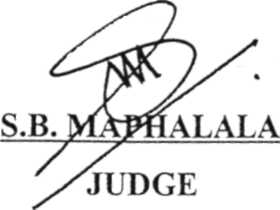THE HIGH COURT OF SWAZILAND WINNIE MUIR Plaintiff And S.C. DLAMINI N.O 1st Defendant THE MASTER OF THE HIGH COURT 2nd Defendant GARY MUIR 3rd Defendant DIANA MUIR 4th Defendant RICHARD MUIR 5th Defendant MELANIE MUIR 6lh Defendant Civil Case No. 3692/02
Coram S.B. MAPHALALA- J
For the Plaintiff Fof the Defendants MR. C.J. LITTLER MR. P.M. SHILUBANE
JUDGEMENT (16/04/2004) The 3rd, 4"h, 5th and 6th Defendants have filed an exception in terms of Rule 23 (3) of the High Court Rules. The Plaintiff who was married to the late Robert Martin Muir (the deceased) in community of property has instituted an action against the 1st Defendant for an order to rectify and amend the first liquidation and distribution account in the estate. The Defendants have filed a notice of intention to defend and the 3rd - 6th Defendants have excepted to the Plaintiffs Particulars of Claim. The first Defendant has filed a plea on the merits of the claim. The Plaintiff then set down the exception for argument as provided for in terms of Rule 6 (14) of the rules of court. The exception is couched in the following language: "Take notice that 3rd, 4,h, 5,h and 6'h Defendants hereby except to Plaintiffs summons on the ground that it discloses no cause of action against them". The argument for the Plaintiff against the exception is that it be dismissed because it does not state clearly and concisely the grounds upon which it is founded. The Plaintiff relied heavily on the dicta in the case of Commissioner for Inland Revenue vs Viljoen 1995 (4) S.A. 476 (E). A further argument advanced for the Plaintiff is that the Defendant's exception has no prayer and is therefore fatally defective and should be dismissed with costs.
Per contra arguments are advanced for the Defendants. On the first attack by the Plaintiff die Defendants 'contend that Rule 23 (3) requires that tile grounds upon which an exception is founded must be set out clearly and "concisely". In casu the exception has done precisely that and has avoided making any lengthy and extensive quotations from authorities or presented what was described in the Viljoen case supra as being in the nature of "a written argument". The Defendants drew the court's attention to the Oxford Dictionary and Webster's Dictionary on the meaning of the word "concise" which is defined as "brief and "curtailed", "marked by brevity in expression or by compact statement without elaboration". On the second leg of the Plaintiffs attack viz that the exception which lacks a prayer is bad in law, the Defendants concede the point but argue that it does not render it fatally defective. The court has the power to order an amendment to make good the defect, provided no prejudice or injustice is thereby caused to the other party. For the latter proposition the court's attention was drawn to the case of Vernon and others N.N.O. vs Bradley and others N.N.O. 1965 (1) S.A. 422 at page 424. Presently before me therefore are two issues for determination, firstly whether the exception taken by the Defendants satisfies the requirements of Rule 23 (3) of the rules; and secondly, as the exception has no prayer does that make it fatally defective, if it does, can the Defendant's be allowed to amend the exception at this stage. Sub-Rule 3 of Rule 23 provides that whenever an exception is taken to any pleading, the grounds upon which the exception is founded shall be clearly and concisely stated. According to Erasmus, Superior Court Practice at Bl - 163 by the phrase "the grounds upon which the exception is founded" the sub-rule obliges the excipient to state in clear and concise terms the particulars upon which his exception is based, and continues the learned author, it is not sufficient merely to state that the summons discloses no cause of action or is vague and embarrassing, (see Moltemo Bros vs S.A. Railways 1936 AD 408 at 417; Sydney Clow & Co. Ltd vs Munnik 1965 (1) S.A. 626 (A) at 634 G; National Union of South African Students vs Meyer Curtis vs Meyer 1973 (1) S.A. 363 (T) at 368 D - E; Cook v Midler 1973 (2) S.A. 240 (N) at 244 A -C; Bothnia vs Laubscher 1973 (3) S.A. 590 (o) at 592 B).
It appears therefore, on the basis of the principle stated in Erasrnus"(supra) that as in casu it is not sufficient merely to state that the summons discloses no cause of action. Therefore, the exception taken in the instant case is bad in law and ought to fail Following from this conclusion the question of the application for amendment to include a prayer does not arise in casu. In the result, the exception taken by the 3rd to 6th Defendant is dismissed with costs.
